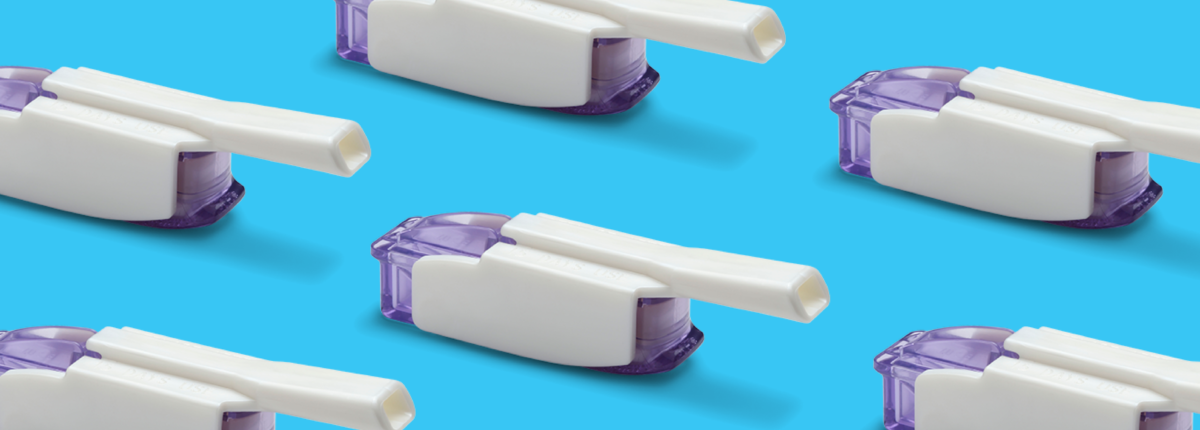Talking to Your Doctor About Inhaled Insulin
This resource on inhaled insulin was made possible with support from MannKind (makers of Afrezza (insulin human) Inhalation Powder), an active partner of Beyond Type 1 at the time of publication. Beyond Type 1 maintains editorial control of all content published on our platforms.
Inhaled insulin might be a perfect addition to your diabetes management routine, whether you have type 1 or type 2 diabetes. Though it has been FDA approved for eight years, it is also still a relatively unknown form of insulin, which means your healthcare team may not know much about it or even think to suggest it to you.
Instead, you may need to start the conversation about using inhaled insulin—Afrezza (insulin human) Inhalation Powder, manufactured by MannKind—to help you reach your blood sugar goals.
- Learn the basics here.
Here are a few things to consider when talking to your healthcare team about inhaled insulin.
Inhaled insulin can be used in Type 1 & Type 2 diabetes
Your doctor may have a few misconceptions about inhaled insulin, including who it’s intended for. The truth is that it’s remarkably versatile and can be used by most people living with diabetes who currently use or who qualify to use fast or rapid-acting mealtime insulin.
If you already use fast or rapid-acting insulin for meals, inhaled insulin can replace some or all of those insulin doses. Afrezza is not for use in place of long-acting insulin. Afrezza must be used with long-acting insulin in people who have type 1 diabetes mellitus. In people with type 2 diabetes who have been reluctant to start injected insulin, inhaled insulin might be a great tool for you.
Afrezza might be a useful part of your diabetes management routine for:
- Mealtime insulin needs
- Improving glycemic control
Afrezza is in and out of your system fast—it begins working within 12 minutes and is cleared within one and a half to three hours, depending on the dose, which allows for supplemental doses if needed.
Afrezza is not recommended for use in people who:
- Are pregnant, planning to become pregnant, or are breastfeeding. Afrezza may harm your unborn or breastfeeding baby
- Are under 18 years old—safety has not been established in children
- Have COPD, asthma, or other chronic respiratory conditions
- Are allergic to regular human insulin or any of the ingredients in Afrezza
- Smoke or have recently stopped smoking (less than six months). It is not known if Afrezza is safe and effective for use in people who smoke
For people with type 2 diabetes who have been reluctant to start injected insulin, Afrezza can be an alternative way to introduce insulin.
Inhaled insulin was designed to fit your lifestyle
The device used to inhale Afrezza’s powdered insulin is unique. There’s nothing electronic, computerized, or highly technical about it. It’s a very small plastic inhaler that holds the individual cartridge of powdered insulin.
When you close the device it opens the new cartridge inside. Then follow the instructions to inhale the insulin into your lungs through your mouth.
The device itself comfortably fits in your pocket or your purse, and the cartridges of inhalable powder are equally small and color-coded to easily recognize the cartridge for your dose. You can take your dose of Afrezza while you’re on the go, at work, at school, etc.
An additional perk of Afrezza is that it can be taken on the go without the need for refrigeration packs. With Afrezza, unopened blister cards can be stored at room temperature for up to 10 days.*
*Afrezza must be used within three days if the strips are opened. You should not put Afrezza back into the refrigerator after being stored at room temperature.
The dosing isn’t the same as injected insulin
“Many providers think inhaled insulin is the same dosing unit-for-unit as injected insulin, but it’s not,” explains Jennifer Okemah, MS, RD, BCADM, CDCES, CSSD, from Salute Nutrition near Seattle, WA. “Like any medication, if the dose isn’t right, you’re going to think it’s not working,” says Okemah.
You and your healthcare provider should decide on the appropriate starting dose, and any dose adjustments, for your specific needs. Clinical trials have shown that it may take approximately one and a half times the amount of Afrezza to achieve the same blood sugar control as injected insulin. At the end of clinical trials (24 weeks), the average patient was receiving 12-16 Afrezza insulin units per meal.
For those who have not taken insulin before, it is recommended to start on 4 units of Afrezza at each meal. Your healthcare provider can work with you to make adjustments up to the correct dose for your metabolic needs and glycemic control goals.
Afrezza inhaled insulin cartridges come in 4-, 8- and 12-unit cartridges. If needed, you can mix and match cartridges to take your prescribed dose. For example, two 12-unit cartridges provide a dose of 24 units of Afrezza.
Getting insurance coverage or financial help
While there may be some reluctance from your health insurance to cover a prescription for Afrezza, it’s important to still push it through the insurance process.
“Anytime there’s a novel medication on the market, there is pushback from health insurance, but you can’t let that stop you,” insists Okemah. “The more we keep pushing for medications, the more it encourages insurance companies to adopt them.”
Okemah says she often turns to MannKind’s AfrezzaAssist® to help a patient get coverage—its patient support guides can help navigate costs and coverage for Afrezza, as well as provide logistical assistance with filling Afrezza and working with your pharmacy
Afrezza also offers a variety of supportive resources to help you navigate the cost of inhaled insulin based on your health insurance status or type.
“It should be in every diabetes care toolbox,” says Okemah.
AFREZZA® (insulin human) Inhalation Powder is a rapid acting inhaled insulin indicated to improve glycemic control in adult patients with diabetes mellitus.
Important Safety Information
What is the most important information I should know about AFREZZA?
AFREZZA can cause serious side effects, including:
- Sudden lung problems (bronchospasms). Do not use AFREZZA if you have long-term (chronic) lung problems such as asthma or chronic obstructive pulmonary disease (COPD). Before starting AFREZZA, your healthcare provider will give you a breathing test to check how your lungs are working.
What is AFREZZA?
- AFREZZA is a man-made insulin that is breathed- in through your lungs (inhaled) and is used to control high blood sugar in adults with diabetes mellitus.
- AFREZZA is not for use in place of long-acting insulin. AFREZZA must be used with long-acting insulin in people who have type 1 diabetes mellitus.
- AFREZZA is not for use to treat diabetic ketoacidosis.
- It is not known if AFREZZA is safe and effective for use in people who smoke. AFREZZA is not for use in people who smoke or have recently stopped smoking (less than six months).
- It is not known if AFREZZA is safe and effective in children under 18 years of age.
What should I tell my healthcare provider before using AFREZZA?
Before using AFREZZA, tell your healthcare provider about all your medical conditions, including if you:
- Have lung problems such as asthma or COPD
- Have or have had lung cancer
- Are using any inhaled medications
- Smoke or have recently stopped smoking
- Have kidney or liver problems
- Are pregnant, planning to become pregnant, or are breastfeeding. AFREZZA may harm your unborn or breastfeeding baby.
Tell your healthcare provider about all the medicines you take, including prescription and over-the-counter medicines, vitamins, or herbal supplements.
Before you start using AFREZZA, talk to your healthcare provider about low blood sugar and how to manage it.
What should I avoid while using AFREZZA?
While using AFREZZA do not:
- Drive or operate heavy machinery, until you know how AFREZZA affects you
- Drink alcohol or use over-the-counter medicines that contain alcohol
- Smoke
Do not use AFREZZA if you:
- Have chronic lung problems such as asthma or COPD
- Are allergic to regular human insulin or any of the ingredients in AFREZZA.
What are the possible side effects of AFREZZA?
AFREZZA may cause serious side effects that can lead to death, including:
See “What is the most important information I should know about AFREZZA?”
Low blood sugar (hypoglycemia). Signs and symptoms that may indicate low blood sugar include:
- Dizziness or light-headedness, sweating, confusion, headache, blurred vision, slurred speech, shakiness, fast heartbeat, anxiety, irritability or mood change, hunger.
Decreased lung function. Your healthcare provider should check how your lungs are working before you start using AFREZZA, six months after you start using it, and yearly after that.
Lung cancer. In studies of AFREZZA in people with diabetes, lung cancer occurred in a few more people who were taking AFREZZA than in people who were taking other diabetes medications. There were too few cases to know if lung cancer was related to AFREZZA. If you have lung cancer, you and your healthcare provider should decide if you should use AFREZZA.
Diabetic ketoacidosis. Talk to your healthcare provider if you have an illness. Your AFREZZA dose or how often you check your blood sugar may need to be changed.
Severe allergic reaction (whole body reaction). Get medical help right away if you have any of these signs or symptoms of a severe allergic reaction:
- A rash over your whole body, trouble breathing, a fast heartbeat, or sweating.
Low potassium in your blood (hypokalemia).
Heart failure. Taking certain diabetes pills called thiazolidinediones or “TZDs” with AFREZZA may cause heart failure in some people. This can happen even if you have never had heart failure or heart problems before. If you already have heart failure it may get worse while you take TZDs with AFREZZA. Your healthcare provider should monitor you closely while you are taking TZDs with AFREZZA. Tell your healthcare provider if you have any new or worse symptoms of heart failure including:
- Shortness of breath, swelling of your ankles or feet, sudden weight gain.
Get emergency medical help if you have:
- Trouble breathing, shortness of breath, fast heartbeat, swelling of your face, tongue, or throat, sweating, extreme drowsiness, dizziness, confusion.
The most common side effects of AFREZZA include:
- Low blood sugar (hypoglycemia), cough, sore throat
These are not all the possible side effects of AFREZZA. Call your doctor for medical advice about side effects.
Please see full Prescribing Information and Medication Guide, including BOXED WARNING at Afrezza.com.





